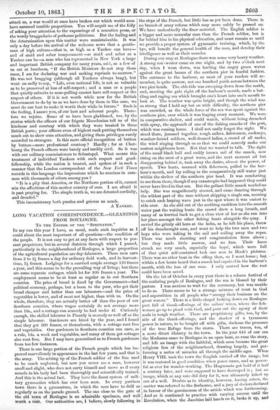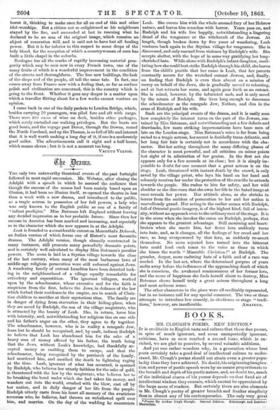LONG VACATION CORRESPONDENCE.—GLEANINGS FROM BOULOGNE.
To THE EDITOR OF THE " SPECTATOR."
Tar my run this year I have, as usual, made such inquiries as I could about the most important of all questions—the condition of the people. It is not easy to get at any facts with respect to pea- sant proprietors, but in several districts through which I passed, particularly in the neighbourhood of Boulogne, a largo proportion of the agricultural population are day-labourers. These men earn from 2 to 2i francs a day for ordinary field work, and in harvest- time, 3} francs. Lodgings for a married couple average 120 francs a year, and this seems to be the prevailing way of living; but there are some separate cottages, which let for 100 francs a year. The employment seems to be at least as regular as in our Southern counties. The price of bread is fixed by the Government—bad political economy, perhaps, but a boon to the poor, who get their bread cheaper and better than our labourers—and the price of vegetables is lower, and of meat not higher, than with us. On the whole, therefore, they are actually better off than the poor of our Southern counties, where wages certainly do not average more than 10s., and a cottage can scarcely be had under 41. Curiously enough, the skilled labourer in Picardy is scarcely so well off as the simple labourer. Gardeners are hired by the year, and I found that they get 500 francs, or thereabouts, with a cottage rent free and vegetables. Our gardeners in Southern counties can earn, as a rule, 14s. a week and vegetables, and many of them get cottages also rent free. But I may have generalized as to French gardeners from too few instances.
There is one large portion of the French people which has im- proved marvellously in appearance in the last few years, and that is the army. The setting up of the French soldier of the line used to be much neglected, but now you never see a man, however small and slight, who does not carry himself and move as if every muscle in his body had been thoroughly and scientifically trained. And this is the actual fact. They have the finest system of mili- tary gymnastics which has ever been seen. In every garrison town there is a gymnasium, in which the men have to drill as regularly as on the parade ground. The one close to the gate of the old town of Boulogne is an admirable specimen, and well worth a visit. Our authorities are, I believe, slowly following in the steps of the French, but little has as yet been done; There is no branch of army reform which may more safely be pressed on. We have undoubtedly the finer material. The English soldier is a bigger and more muscular man than the French soldier, but is far behind him in his physical education, and must remain so until we provide a proper system of gymnastic training, which, by the bye, will benefit the general health of the men, and develop their intelligence as well as their muscles.
During our stay at Boulogne there was some very heavy weather. A strong sou'-wester came on one night, and by two o'clock next day, when I went down, was hurling the angry green waves against the great beams of the southern pier in fearful fashion. The entrance to the harbour, as most of your readers will re- member, is quite narrow, not one hundred yards across between the two pier-heads. The ebb-tide was sweeping down from the north, and, meeting the gale right off the harbour's mouth, made a bat- tling and raging sea which brought one's heart into one's mouth to look at. The weather was quite bright, and though the wind was so strong that I held my hat on with difficulty, the northern pier was crowded, as the whole force of the sea was spout against the southern pier, over which it was leaping every moment. We were in comparative shelter, and could watch, without being drenched with spray, the approach of one of the fishing smacks of the port, which was coming home. I shall not easily forget the sight. We stood there, jammed together, rough sailors, fishwomen, cockneys, weather-bound soldiers, well-dressed ladies, a crowd of all ranks, the wind singing through us so that we could scarcely make our nearest neighbours hear. Not that we wanted to talk. The sight of the small black hull and ruddy brown sail of the smack, now rising on the crest of a great wave, and the next moment all but disappearing behind it, took away the desire, almost the power, of speech. Two boats, manned with fishermen, pulled to the har- bour's mouth, and lay rolling in the comparatively still water just within the shelter of the southern pier head. It was comforting to see them there, though if any catastrophe had happened they could never have lived in that sea. But the gallant little smack needed no help. She was magnificently steered, and came dancing through the wildest part of the race without shipping a single sea, seeming to catch each leaping wave just in the spot where it was easiest to ride over. As she slid out of the seething cauldron into the smooth water past the waiting boats the crowd drew a long breath, and many of us hurried back to get a close view of her as she ran into her place amongst the other fishing boats alongside the quay. I envied the grizzly old hero at the helm, as he left his place, threw off his dreadnought coat, and went to help the two men and two boys who were taking in the sail and coiling away the ropes. There was much shouting and congratulation from above ; but they made little answer, and no fuss. Their faces struck me very much, especially the boys', which were full of that quiet self-contained look one sew in Hook's pictures. There was no other boat in the offing then, so I went home ; but within a few hours heard that a smack had capsized in the harbour's mouth, with the loss of one man. I only marvel how the rest, could have been saved.
On the 1st of October in every year there is a solemn festival of the seafaring people of Boulogne, and the sea is blessed by their pastors. I was anxious to wait for the ceremony, but was unable to do so. There seems to be a strange mixture of trust in God and superstition in all people who "occupy their business on the great waters." There is a little chapel looking down on Boulogne port full of thank-offerings of the sailors' wives, whore the fish- women go up to plead with God, and pour out the agony of their souls in rough weather. There are propitiatory gifts, too, by the side of the thank-offerings, and the shadow of a tyrannous power in nature, to be bought off with gifts, darkens the presence of the true Refuge from the storm. There are traces, too, of a more direct idolatry in the town. In the year 643 of our era the Madonna came to Boulogne in an open boat, so runs the story, and left an image with the faithful, which soon became the groat religious lion of the neighbourhood, drawing largely, and per- forming a series of miracles all through the middle ages. When Henry VIII. took the town the English carried off the image, but it was restored in good condition when peace came, and as power- ful as ever for wonder-working. The Huguenots got hold of it half a century later, and were supposed to have destroyed it ; but an image, which at any rate did duty for it, was ultimately fished up out of a well. Doubts as to identity, however, having arisen, the matter was referred to the Sorbonne, and a jury of doctors declared in favour of the genuineness of the article which was forthcoming. And so it continued to practice with varying success until the Revolution, when the Jacobins laid hands on it, broke it up, and
burnt it, thinking to make once for all an end of this and other idol-worships. But a citizen not so enlightened as his neighbours stayed by the fire, and succeeded at last in rescuing what he declared to be an arm of the original image, which remains an object of veneration still, and is said not to have lost all healing power. But it is far inferior in this respect to some drops of the holy blood, for the reception of which a countrywoman of ours has built a little chapel in the suburbs.
Boulogne has all the marks of rapidly increasing material pros- perity which may be seen now in every French town, one of the many fruits of which is a wonderful improvement in the condition of the streets and thoroughfares. The fine new buildings, the look of the shops and of the people, all tell the same tale. In fact, one comes away from France now with a feeling that, so far as surface polish and civilization are concerned, this is the country which is going to the front. Whether it goes any deeper is a matter upon which a traveller flitting about for a few weeks cannot venture an opinion.
I came back in one of the daily packets to London Bridge, which, besides carrying 70 passengers, was piled fore and aft with cargo. There were 403 cases of wine on deck, besides other packages, which sorely curtailed our walking privileges. But the boats are good boats, and the voyage past Dover, through the Downs, round the North Foreland, and up the Thames, is so full of life and interest that it is well worth making a long day of it, if one is a moderately good sailor. The advertisements call it eight and a half hours, which means eleven ; but it is not a moment too long.
VACUUS VIATOR.































 Previous page
Previous page